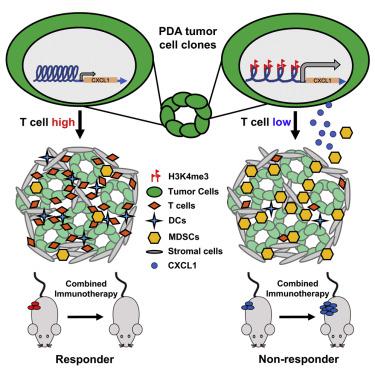Immunity ( IF 25.5 ) Pub Date : 2018-06-26 , DOI: 10.1016/j.immuni.2018.06.006 Jinyang Li 1 , Katelyn T Byrne 2 , Fangxue Yan 1 , Taiji Yamazoe 1 , Zeyu Chen 3 , Timour Baslan 4 , Lee P Richman 1 , Jeffrey H Lin 1 , Yu H Sun 5 , Andrew J Rech 6 , David Balli 1 , Ceire A Hay 7 , Yogev Sela 1 , Allyson J Merrell 1 , Shannon M Liudahl 8 , Naomi Gordon 1 , Robert J Norgard 1 , Salina Yuan 1 , Sixiang Yu 1 , Timothy Chao 1 , Shuai Ye 1 , T S Karin Eisinger-Mathason 1 , Robert B Faryabi 9 , John W Tobias 10 , Scott W Lowe 11 , Lisa M Coussens 8 , E John Wherry 12 , Robert H Vonderheide 13 , Ben Z Stanger 14

|
The biological and functional heterogeneity between tumors—both across and within cancer types—poses a challenge for immunotherapy. To understand the factors underlying tumor immune heterogeneity and immunotherapy sensitivity, we established a library of congenic tumor cell clones from an autochthonous mouse model of pancreatic adenocarcinoma. These clones generated tumors that recapitulated T cell-inflamed and non-T-cell-inflamed tumor microenvironments upon implantation in immunocompetent mice, with distinct patterns of infiltration by immune cell subsets. Co-injecting tumor cell clones revealed the non-T-cell-inflamed phenotype is dominant and that both quantitative and qualitative features of intratumoral CD8+ T cells determine response to therapy. Transcriptomic and epigenetic analyses revealed tumor-cell-intrinsic production of the chemokine CXCL1 as a determinant of the non-T-cell-inflamed microenvironment, and ablation of CXCL1 promoted T cell infiltration and sensitivity to a combination immunotherapy regimen. Thus, tumor cell-intrinsic factors shape the tumor immune microenvironment and influence the outcome of immunotherapy.
中文翻译:

肿瘤细胞内在因素是免疫细胞浸润和免疫治疗反应异质性的基础。
肿瘤之间的生物学和功能异质性(包括跨癌症类型和癌症类型内部)对免疫治疗构成了挑战。为了了解肿瘤免疫异质性和免疫治疗敏感性的潜在因素,我们从胰腺癌的本土小鼠模型中建立了一个同源肿瘤细胞克隆库。这些克隆产生的肿瘤在植入免疫功能正常的小鼠时概括了 T 细胞发炎和非 T 细胞发炎的肿瘤微环境,具有免疫细胞亚群的不同浸润模式。共同注射肿瘤细胞克隆显示非 T 细胞发炎表型占主导地位,并且瘤内 CD8+ T 细胞的定量和定性特征都决定了对治疗的反应。转录组学和表观遗传学分析显示,趋化因子 CXCL1 的肿瘤细胞内在产生是非 T 细胞炎症微环境的决定因素,CXCL1 消融促进 T 细胞浸润和对联合免疫治疗方案的敏感性。因此,肿瘤细胞内在因素塑造肿瘤免疫微环境并影响免疫治疗的结果。































 京公网安备 11010802027423号
京公网安备 11010802027423号